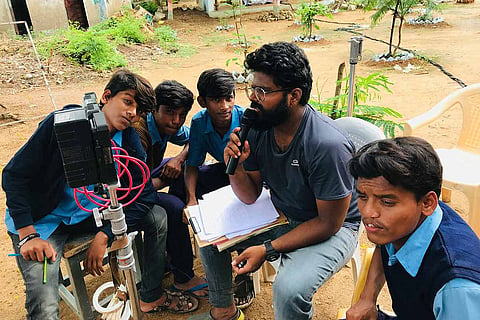

Season of Innocence, a Telugu children’s film revolving around sex education that was shot entirely in a Telangana village, has been selected for the Ahmedabad International Children’s Film Festival. Directed by Hyderabad-based Uday Chauhan, the film was shot in 2019 and its post-production was completed recently. The film has also been invited to the International Children’s Film Festival of Jaipur for the official selection. In a chat with TNM, Uday Chauhan speaks about Season of Innocence, the challenges he faced during the shoot and the concept behind his film.
I began working on the screenplay of Season of Innocence during my post-graduation. I wanted it to be my dissertation. However, I had to shelve the project back then as I couldn’t find the right person to play the lead role. My professor, Anupam Barve, once told me that this could be my first feature film. It was in 2018 that I finished the screenplay and we shot the movie in 2019. However, due to the pandemic the post-production was delayed. We have now finally finished the film.
The almost 2-hour long film is set in a rural environment (Rajunayak Tanda in Mahbubnagar district) and the protagonist is a 15-year-old boy. The film, which has several layers to it, has five main child characters. It revolves around sex education, something that our society is still not very comfortable talking about. It portrays how society, knowingly or unknowingly, injects masculinity into everyone, including innocent kids. It also reflects how digitalisation has percolated into villages and the kind of impact it has had on kids.
It took me around 6 months to talk to the people of the village and be accepted. I then narrated the script to them and began giving the children workshops to train them. By the time I finished writing the screenplay and training the actors, I still had a very small budget as we had not found a producer back then. I then found producers, they travelled with me to the village and stayed for a couple of days. Seeing the kids practise, they recognised the potential of the film. It took some time to get them on board. During this period, I had to travel to the village several times.
When filming started, as we were shooting in sync sound it was a herculean task to control the village crowd. The entire set had to be disciplined and quiet. It was a team effort and they cooperated with us very well.
There are multiple things that set this film apart. To begin with, the child actors were chosen from the same village where we shot, and trained in acting. This is a low budget film. We have used sync sound for the entire film. Commercial films don’t use sync sound, they do dubbing. As a director, I feel the audio and visuals add to the real impact felt by the audience. Every village has its own ambience, Rajunayak Tanda also has its own. As the main characters are all children, sync sound was a better option as it is difficult for the kids to do dubbing. Sync sound gives actors the chance to delve into the character. Another thing that sets the film apart is the aspect ratio of this film. I wanted it to be shot in a way that captures the beauty of the location in a better manner.
The film is produced by GV Raag and Anudeep Gersappe under the Clown Pictures banner. The music direction is by Harshavardhan Rameswar.
Rajunayak Tanda is where my parents hail from. This is the main reason I decided to shoot in this village. All the characters live in this village. Once we shortlisted the children, we had to train them as they are all first-time actors. Some portions were shot in the adjacent villages as well. Initially, it was a challenge to explain to the village residents about the movie. When I began visiting often, I built a rapport with them. I began interacting with the children to understand their experiences and their perspective.
The entire shooting was completed in 30 days. To cut the costs and save time, the entire crew stayed in the village throughout the shoot.
This film started because of my mother’s motivation. She always wanted me to do a film on a social cause. My family has been very supportive. In fact, my parents were also involved throughout the shooting. They handled a lot of things in the village. After the shoot, they understood the kind of effort that goes into making a film. They were initially very emotional. It was a dream come true for me as well as for them. My wife has also been very supportive and understanding.
This is a dream project for me. I figured I couldn’t enter the industry very easily as getting a break for a fresher is very difficult. Finding producers is also a very tough task. I thought I should try something fresh and new. Until and unless something unique was in the pipeline, I knew entering the industry would be difficult. I wanted the film to be real, raw and rooted.
The film has been selected for the Ahmedabad International Children’s Film Festival. We have also got an official invitation for the selections at the International Children’s Film Festival of Jaipur. We’re also in talks with OTT platforms presently. We’re planning a world premiere in March.